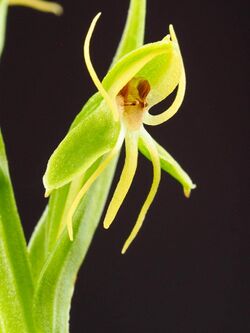Biology:Habenaria repens
From HandWiki
Short description: Species of orchid
| Habenaria repens | |
|---|---|

| |
| Scientific classification | |
| Kingdom: | Plantae |
| Clade: | Tracheophytes |
| Clade: | Angiosperms |
| Clade: | Monocots |
| Order: | Asparagales |
| Family: | Orchidaceae |
| Subfamily: | Orchidoideae |
| Genus: | Habenaria |
| Species: | H. repens
|
| Binomial name | |
| Habenaria repens Nutt. (1818)
| |
| Synonyms[1] | |
| |
Habenaria repens, commonly called the water-spider bog orchid or the floating orchid, is an orchid species widespread across Latin America from Mexico and the West Indies south to Argentina , as well as in the Southeastern United States from Texas and Oklahoma east to Florida and the Carolinas plus an isolated population in Virginia.[1][2][3][4][5][6][7][8][9][10][11][12]
A phenolic compound called habenariol can be found in H. repens.[13] It acts as a feeding deterrent.[14]
Varieties
Two taxonomic varieties are accepted as of June 2014:[1]
- Habenaria repens var. maxillaris (Lindl.) Garay - Guatemala, Colombia, Ecuador, Peru, Bolivia
- Habenaria repens var. repens - most of species range including those regions listed for var. maxillaris
References
- ↑ 1.0 1.1 1.2 Kew World Checklist of Selected Plant Families
- ↑ Flora of North America v 26 p 582, Habenaria repens Nuttall, Gen. N. Amer. Pl. 2: 190. 1818.
- ↑ Biota of North America Program, county distribution map
- ↑ Hammel, B.E. & al. (2003). Manual de Plantas de Costa Rica 3: 1-884. Missouri Botanical Garden Press, St. Louis.
- ↑ Nelson Sutherland, C.H. (2008). Catálogo de las plantes vasculares de Honduras. Espermatofitas: 1-1576. SERNA/Guaymuras, Tegucigalpa, Honduras.
- ↑ Hokche, O., Berry, P.E. & Huber, O. (eds.) (2008). Nuevo Catálogo de la Flora Vascular de Venezuela: 1-859. Fundación Instituto Botánico de Venezuela.
- ↑ Gonzáles Tamayo, J.R. & Hernández Hernández, L. (2010). Las Orquídeas del occidente de México 1: 1-303. Coecytjal.
- ↑ Schinini, A. (2010). Orquídeas nativas del Paraguay. Rojasiana 9: 1-316.
- ↑ Ferreira, A.W.C., Lima, M.I.S. & Pansarin, E.R. (2010). Orchidaceae na região central de São Paulo, Brasil. Rodriguésia; Revista do Instituto de Biologia Vegetal, Jardim Botânico e Estaçao Biologica do Itatiaya 61: 243-259.
- ↑ Batista, J.A.N., de Bem Bianchetti, L., González-Tamayo, R., Figueroa, X.M.C. & Cribb, P.J. (2011). A synopsis of New World Habenaria (Orchidaceae) II. Harvard Papers in Botany 16: 233-273.
- ↑ Baptista, J.A.N., Menini Neto, L. & Vale, A.A. (2012). Three new species, four new records and an updated checklist of Habenaria (Orchidaceae) from Rio Grande do Sul, Brazil. Nordic Journal of Botany 30: 277-290.
- ↑ Acevedo-Rodríguez, P. & Strong, M.T. (2012). Catalogue of seed plants of the West Indies. Smithsonian Contributions to Botany 98: 1-1192.
- ↑ A phenolic antioxidant from the freshwater orchid, Habenaria repens. Johnson MK, Alexander KE, Lindquist N and Loo G, Comp Biochem Physiol C., February 1999, volume 122, issue 2, pages 211-214, PMID 10190047
- ↑ Habenariol, a freshwater feeding deterrent from the aquatic orchid Habenaria repens (Orhicaceae). Wilson D.M, Fenical W, Hay M.E, Lindquist N and Bolser R, Phytochemistry, 1999, Volume 50, pages 1333-1336, doi:10.1016/s0031-9422(98)00340-9
External links
- Aquatic and Invasive Plant Identification Series by the UF/IFAS at www.youtube.com
- plants.usda.gov
- plants.ifas.ufl.edu
- www.efloras.org
Wikidata ☰ Q15482311 entry
 |

